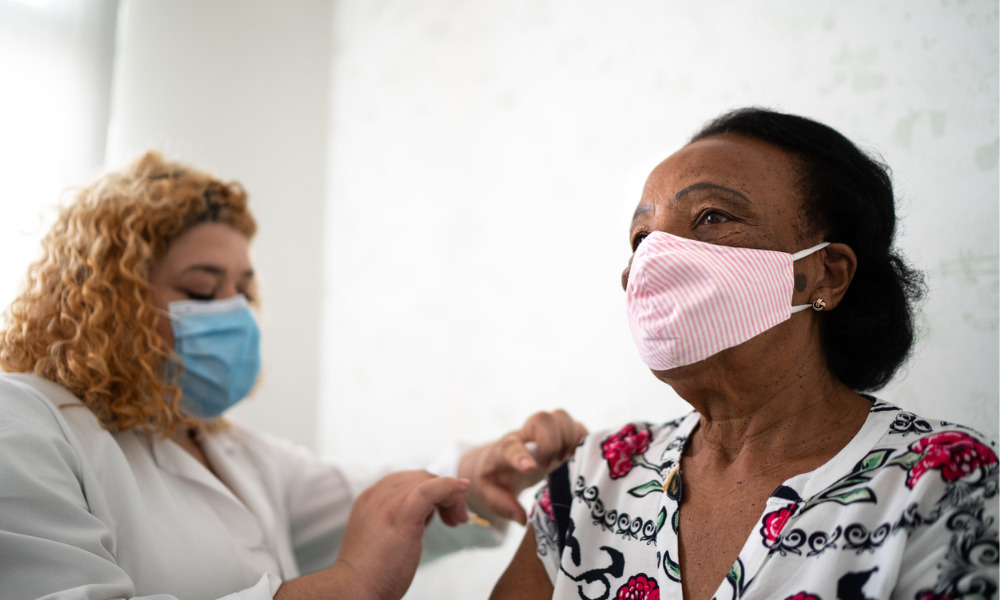6 key questions on the legalities of requiring, delivering the immunization, and dealing with refusals

With the hopeful news that Canada will be receiving COVID-19 vaccine doses in the near future, embattled employers might face potentially thorny legal questions around the issue.
Canadian HR Reporter spoke with Shaun Parker, employment and labour associate at Osler in Calgary, about some of the issues organizations should keep in mind.
Q: Can workers be mandated to take the COVID-19 vaccine?
A: “I’d be very reticent to counsel any employer to mandate vaccination for their employees and the reason is it opens up a whole host of issues with human rights considerations, as well as privacy law implications. It’s a very thorny issue. Absent clear government direction that this should be mandated, I’d be very slow to do it in most workplaces.”
Q: Should employers request proof of having taken the vaccine?
A: “Short answer is, yes. An employer can and it should but the key thing for employers is you build this into the employer’s COVID-19 policies and protocols. You don’t want to just be requesting proof of vaccination willy-nilly; you want it to serve a purpose.
“For example, we’ve seen it before in the case law in the health-care sector where nurses, for instance, have had the choice between taking a flu shot or if they refuse, then they have to wear a mask at work. I don’t know if that translates into COVID the same way but that could be an example of how you use a vaccination with your COVID-19 protocols.
“There may be breaks cut to employees who have chosen to be vaccinated or they may get some quicker back-to-normal treatments than employees who choose not to do that.

Shaun Parker
“If the medical evidence supports that people who have been vaccinated, for instance, don’t need to follow the same sort of social distancing protocols… those people perhaps [may] start getting exempted from the otherwise more rigid protocols an employer has.”
Q: What happens if employees refuse to vaccinate or disclose if they have taken it?
A: “It’s going to depend heavily on how the employer’s COVID-19 policies are set up, as well as the nature of the workplace. My general caution to employers is ‘There’s not even a vaccine out in Canada yet but be very careful about taking too aggressive an approach early on.’
“I could see… for the first few months of the vaccine’s roll-out, generally, an employer would want to take things slow. Cut to a year from now, after the vaccine is generally available, that may materially change an employer’s position to where they can push harder.
“You can’t force people to take the vaccine but there may be a time and place where — and depending on the nature of the industry — an employer can’t accommodate employees who are refusing to be vaccinated based on medical evidence, or medical considerations. We don’t know what that looks like now, so ‘Take it slow’ is my counsel.”
Q: Would the issue matter more for certain professions?
A: “Absolutely. Certainly, where we’re going to see these battles first arise is in the health-care sector: hospital workers, where there’s a care facility -- those industries have been the one to adopt, historically, mandatory flu vaccinations or who have really pushed the flu vaccinations. It’s going to be similar with COVID, just because you’re dealing with populations and employees who are most at risk.
“I could also see it spilling over into the airline industry perhaps, especially as international air travel resurfaces and starts getting going again. That’s where the fights are going to happen immediately, and we’re going to see some of this played out.
“For employers and other industries, [they should] watch and learn with those experiences, and they may save themselves a headache and some costly legal battle.”
Q: Should employers offer vaccines at work?
A: “As long as the employer can get the vaccine, similar to the flu shot, absolutely. We’ve started getting some questions on this from clients but, thinking ahead, treat it like you would with your annual flu program.
“If you can get the vaccine, and you can make it available to your employees, roll it out with an information program extolling the benefits the same way an employer might with its annual flu program.”
“If the medical evidence supports that people who have been vaccinated, for instance, don’t need to follow the same sort of social distancing protocols… those people perhaps start getting exempted from the otherwise more rigid protocols an employer has.”
Q: Who should administer the vaccinations?
A: “Look to the medical authorities, and specifically what guidance they have. My suspicion is it’s going to have to be a nurse of some sort, or perhaps somebody with some sort of medical training, especially if it’s an inoculation. You’re going to want to make sure that it’s a qualified medical practitioner.
“You want to have people on the ground ready to deal with accommodation issues, especially as part of this vaccine rollout program; the employer is going to want to keep an eye on people who [object] for religious or disability reasons. [Employers are] going to want to make sure that they not take adverse employment action against people who can’t get vaccinated.
Recently Canadian HR Reporter also spoke to experts about who is liable if an employee contracts the coronavirus and we looked at some of the rules around independent contractors and how to handle sick service providers.




